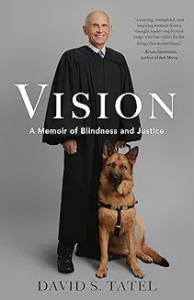Vision: A Memoir of Blindness and Justice by David Tatel 2024
In this engaging and relevant memoir, David Tatel writes about his 30 years on the D.C. Court of Appeals and his concerns about the Supreme Court and America’s future.
Tatel, the son of an accomplished engineer/inventor/astronomer father and an entrepreneurial mother, developed a strong sense of justice, fairness, and right and wrong from an early age. After college at U. of Michigan (a fellow alum!) where he met his wife, he entered law school at the U. of Chicago where he learned how the law could be used to address inequities in society.
A series of leadership roles in national social justice non-profits and a long standing partnership in a D.C. law firm that gave him the opportunity to do pro bono work in the area of education led to his being named to the D.C. Circuit by President Clinton in 1994. There his work over the next three decades was guided by three principles: judicial restraint, respect for precedent, and commitment to the Constitution and the separation of powers. His opinions, frequently dissenting, were important in environmental and constitutional debates often anticipating a Supreme Court that was increasingly ignoring those principles.
Oh, did I forget to mention that Tatel is blind? Affected by a rare genetic X-linked condition, retinitis pigmentosa, he began losing his vision in his teens and by the time of his appointment to the Court, he was totally blind. His tale of how he covered up his disability for years relying on guidance of friends and his hearing and acute mind and how he eventually came to embrace the use of a guide dog, his much loved Vixen, is engrossing and moving.
In reading this book, I learned a great deal about how the courts function in America—the role and procedures of the Court of Appeals in contrast to the Federal District Court, the choosing of clerks, the writing of opinions—as well as about the major issues Tatel grappled with and which still bedevil the nation, primarily cases affecting the environment and our fragile democracy. The EPA and its scope, the Voting Rights Act, the limits of free speech, and other critical issues were in Tatel’s court where his opinions were often overruled by today’s conservative and overtly political SCOTUS. In one particularly acute observation, Tatel worried that the Supreme Court would overturn the precedent giving regulatory agencies the ability to regulate, and as he had predicted, the Court did just that.
This is an excellent book. It was given to me by my sister who has known Tatel and his wife Edie for many years. She was introduced to him by her partner who had met Tatel when he was the Director of the Office for Civil Rights in the Carter administration and they became life long friends. Highly recommended.



